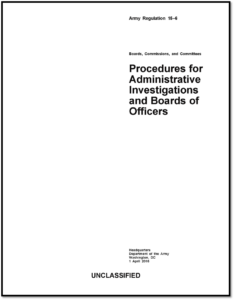What is the Army Adverse Information Program (AAIP)?
The Army Adverse Information Program (AAIP) is the repository or database for findings of adverse information relating to officers in the grade of O1 and higher resulting from command directed administrative investigations conducted pursuant to Army Regulation (AR) 15–6 (Procedures for Administrative Investigations and Boards of Officers) (1 April 2016) and DA Instruction 2023-03 (Army Adverse Information Program) (22 February 2023). In the case of a command directed investigation or board that contains findings of adverse information regarding officers in the grade of O1 or higher, the approval authority will keep the original and a digital copy of the final report of proceedings, and the redacted version as provided to the officer for a period of 10 years. In addition, the approval authority will comply with specific filing requirements set forth in other regulations or directives, to include requirements to synopsize and upload portions of the investigations into a centralized database (AAIP).
What is a Command Directed Investigation for the Purposes of the Army Adverse Information Program (AAIP)?
For the purposes of filing in the Army Adverse Information Program (AAIP) database or repository, command directed investigations can take four (4) different shapes in the Army: 1) a preliminary inquiry; 2) an administrative investigation; 3) a collateral investigation; or 4) a board of officers. Each will be described below:
What is a Preliminary Inquiry? A preliminary inquiry is simply an informal investigation. The purposes of a preliminary inquiry include, but are not limited to, ascertaining the magnitude of a problem; identifying and interviewing witnesses and summarizing and recording their statements; and determining whether a more extensive investigation is warranted, and, if warranted, assisting in determining the scope of such investigation. While a preliminary inquiry may result in the need to conduct an administrative investigation under the provisions of Chapter 5 of AR 15-6, it need not follow the procedural requirements of an administrative investigation or a board. A preliminary inquiry under Chapter 4 of AR 15-6 may satisfy the preliminary inquiry requirement, sometimes referred to as “commander’s inquiry,” in RCM 303, MCM. To be reported in the AAIP, and preliminary inquiry should be followed up by an administrative investigation.
What is an Administrative Investigation? An administrative investigation is more formal than a preliminary investigation, but less formal than a board of officers, and is utilized to investigate allegations made against Soldiers, whether they involve leadership, command climate, or alleged misconduct. Administrative investigation procedures are used by a single Investigating Officer (IO), or by an investigation team consisting of an IO and one or more assistant IOs designated by the appointing authority to assist the IO in questioning witnesses, taking sworn statements, and otherwise facilitating evidence gathering. Administrative investigation procedures are not intended to provide a hearing for Soldiers who may have an interest in the subject of the investigation. No respondents will be designated and, except for an officer in the grade of O1 and above, upon a finding of adverse information, no one is entitled to the rights of a respondent. The IO may still make any relevant findings or recommendations, including those adverse to an individual or individuals.
What is a Collateral Investigation? Collateral investigations are investigations performed in conjunction with another type of investigation (i.e. death investigation or safety investigation) and serve a specific purpose. Other regulations generally specify when a collateral investigation must be conducted, the scope of the collateral investigation, and which investigation takes priority. Unless otherwise specified, collateral investigations use the procedures established for administrative investigations in AR 15-6. Unless otherwise specified, the appointing authority may determine which investigation takes priority.
What is a Board of Officers? A Board of Officers is a formal investigation involving allegations against a Soldier, usually involving misconduct. The appointing authority appoints a three-person board, all senior in rank to the designated respondent, a “prosecutor” called a recorder, and a legal advisor to the board. The respondent is provided notice of the purpose of the board, and is afforded several rights, including the right to be represented by counsel, the right to challenge the board members, the right to present evidence and witnesses, the right to cross-examine witnesses offered by the recorder, the right to be present at all sessions of the board proceedings, and the right to make argument to the board. At the conclusion of the proceedings, the board members deliberate in a closed session, and issue findings based upon the evidence presented at the board hearing.
What is the History of the Army Adverse Information Program (AAIP)?
Findings of Adverse Information Reporting Prior to 2014. Before 2014, there was little to no reporting of findings of adverse information from command directed investigations to promotion boards in the military. While there was a reporting requirement for adverse information for general officers in the EO, MEO, and IG records, the 1995 DoDI 1320.4 did not address command directed investigations. Further, the adverse and reportable information reporting processes for general officers differed across the Services and none of the Service personnel involved with these processes had either expertise in, or the designated responsibility for, the entire process. There were no reporting requirements for findings of adverse information in command directed investigations for officers in the grade of O6 and below.
Findings of Adverse Information Reporting in 2014. In 2014, DoD reissued DODI 1320.04 (updated in June 2020) which included the reporting of command directed investigations. It defined adverse information as “any substantiated adverse finding or conclusion from an officially documented investigation or inquiry or any other credible information of an adverse nature. To be credible, the information must be resolved and supported by a preponderance of the evidence. To be adverse, the information must be derogatory, unfavorable, or of a nature that reflects clearly unacceptable conduct, integrity, or judgment on the part of the individual.” At about the same time, Federal law, Title 10 USC § 615, made reporting adverse information to promotion boards required for officer’s “above the grade of Captain” including “any credible information of an adverse nature, including any substantiated adverse finding or conclusion from an officially documented investigation or inquiry.” This law gave birth to the Adverse Information Pilot Program (AIPP).
Creation of Adverse Information Pilot Program (AIPP) in AR 15-6. On 1 April 2016, AR 15-6 was updated to reflect the new Adverse Information Pilot Program (AIPP) which required filing of adverse information pertaining to field grade officers for 10 years in a central database to be used for reporting to promotion boards. The revision also granted field grade officers the right to rebut or respond to findings of adverse information by the Investigating Officer prior to the review of the investigation by the approval authority. The Adverse Information Pilot Program (AIPP) later became the Army Adverse Information Program (AAIP).
Revisions to Findings of Adverse Information Reported to Promotion Boards in 2020. The 2020 NDAA broadened the use of findings of adverse information to include review by the newly created Special Selection Review Boards (SSRB). The SSRB applied to all commissioned officers up to the rank of Major General (O8). The Federal Law establishing the SSRB (10 USC § 14502a) provides, if it is discovered that the officers (O8 and below) are “the subject of credible information of an adverse nature, including any substantiated adverse finding or conclusion (including any substantiated adverse finding or conclusion from an officially documented investigation or inquiry), that was not furnished to the promotion board during its consideration of the office for promotion,” a Special Selection Review Board will review the officer’s selection and recommend whether the selection for promotion of the officer should be sustained. It was only a matter of time before the Army Adverse Information Program (AAIP) was expanded to include all commissioned officers.
Revision of the Army Adverse Information Program (AAIP) in 2023. On 23 February 2023, Army Directive 2023-03 (Army Adverse Information Program) expanded the AAIP (formerly the AIPP) to require the filing of all findings of adverse information in command directed investigations for all officers in the grade of O1 and above in the AAIP database for sharing with the SSRB. It also revised AR 15-6 to give officers in the grade of O1 and above the right to respond to or rebut findings of adverse information in command directed investigations. As of May 24, 2023, AR 15-6 has not been updated to reflect the changes directed in Army Directive 2023-03 and the AAIP.
What is Considered Adverse Information According to Army Regulation?
According to the most recent version of AR 15-6 (1 April 2016), adverse information is “information is any substantiated adverse finding or conclusion from an officially documented investigation or inquiry or any other credible information of an adverse nature. To be credible, the information must be resolved and supported by a preponderance of the evidence. To be adverse, the information must be derogatory, unfavorable, or of a nature that reflects clearly unacceptable conduct, integrity, or judgment on the part of the individual. The following types of information, even though credible, are not considered adverse: (1) motor vehicle violations that did not require a court appearance; (2) minor infractions without negative effect on an individual or the good order or discipline of the organization that: (a) were not identified because of substantiated findings or conclusions from an officially documented investigation; and (b) did not result in more than a nonpunitive rehabilitative counseling administered by a superior to a subordinate.”
What Regulation and Instruction Implements the former Army’s AIPP and now the Army Adverse Information Program (AAIP)?
Army Regulation (AR) 15-6 (Procedures for Administrative Investigations and Boards of Officers) (1 April 2016) and Department of the Army Directive 2023-03 (Army Adverse Information Program (AAIP)) (22 February 2023) implements the Army Adverse Information Program (AAIP).
How do the Different Services Report Findings of Adverse Information (AIPP in the Army) from Command Directed Investigations (AR 15-6 Investigations)?
According to Table 5.1, page 63, Managing Adverse and Reportable Information Regarding U.S. Military Officers 2019 Update (Rand Report), the different services manage findings of adverse information from command directed investigation in widely varied manners. In the Air Force, all command directed investigations are reported in the U.S. Air Force Inspector General database (Automated Case Tracking System (ACTS)) by the local Inspector General’s office as soon as the investigation is opened. In the Marine Corps, all command directed investigations are reported in the Officer Disciplinary Notebook Management System (ODNMS), an internet-based database for reporting and tracking open officer misconduct and substandard performance cases, by the local Staff Judge Advocate’s office as soon as the investigation is opened. In the Navy, there is no centralized reporting repository or database for reporting adverse information stemming from command directed investigations. In the Army, all command directed investigation (AR 15-6 administrative investigations and boards) are reported in the Adverse Information Pilot Program (AIPP) (now Army Adverse Information Program (AAIP)) database by the local Staff Judge Advocate’s office for all findings of adverse information for officers in grades O4 to O6 (now all officers in the grade of O1 and above as required by DA Instruction 2023-03) for substantiated and approved investigations.
What Are an Officer’s Rights to Respond to a Substantiated Finding of Adverse Information in an Investigation Covered by the Army Adverse Information Program (AAIP)?
Right to Respond to Findings of Adverse Information. According to AR 15-6 as modified by DA Instruction 2023-03, officers in the grade of O1 and above have the right to respond to findings of adverse information in command directed administrative investigations. Although the investigation procedures are not intended to provide a hearing for interested persons, officers in the grade of O1 and above have a right to respond to adverse information in a report of proceedings. This right exists regardless of whether adverse administrative action is recommended or contemplated against the officer.
Findings of Adverse Information and Supporting Evidence are Referred to the Officer. When an officer in the grade of O1 and above has the right to respond to a finding of adverse information, the portion of the report of investigation and supporting evidence pertaining to the adverse information will be referred to the officer after being properly redacted. The officer will have at least 10 business days to respond.
The Officer’s Response to Findings of Adverse Information is not a Substitute for an Interview. The right of an officer in the grade of O1 and above to respond to findings of adverse information should not influence the conduct of an investigation. The officer’s right to respond to findings of adverse information will not serve as a substitute for attempting to interview the individual during the investigation by the Investigating Officer.
Right to Respond to Findings of Adverse Information is Based on the Fact that they are Reviewed by the Promotion Board or the SSRB. The right to respond to adverse information is extended by DA Directive 2023-03 only to officers in the grade of O1 and above, because such findings or recommendations may be considered in future promotion boards and Special Selection Review Boards (SSRB) that will consider those officers for promotion. This does not require nor preclude approval authorities from extending this opportunity to any other individual who is the subject of adverse information in the report of proceedings.
What Should an Officer Include in Their Response or Rebuttal to a Substantiated Finding of Adverse Information in the Army Adverse Information Program (AAIP)?
The officer’s (grades O1 and above) response to the findings of adverse in a command directed investigation may include anything that the officer deems to be relevant to the finding, including, but not limited to, a rebuttal memorandum prepared by the officer or his representative, additional evidence in any format, and letters of support. All materials provided in response or rebuttal to findings of adverse information will be included as an exhibit to the report of proceedings. Information that could be useful in responding or rebutting the substantiated finding of adverse information in a command directed investigation include the following:
Address the Finding of Adverse Information. Clearly identify and address the specific adverse information that serves as the basis for the finding of adverse information. Ensure that there is a thorough understanding of the allegations or negative feedback against the officer. It is important that one refutes the allegations contained in the adverse information and provides evidence to the contrary. It is critical to address each adverse finding individually.
Assess the Accuracy and Context of the Finding of Adverse Information. Evaluate the accuracy and context of the adverse information. If there are any inaccuracies or misunderstandings, gaps in logic, internal contradictions, or inconsistencies, provide detailed evidence to refute them. Offer a balanced perspective that provides context for the situation or events in question. Be sure to demonstrate the unlikelihood of the finding of adverse information as it relates to the totality of the existing evidence in the command directed investigation.
Develop Rebuttal Arguments. Develop rebuttal arguments logically and coherently. Present a well-structured response that addresses each allegation or negative feedback individually. Use facts, evidence, and objective data to support the rebuttal. Include any relevant documentation, such as performance evaluations, commendations, or testimonials and witness statements that counter the adverse information. If the Investigating Officer has based the findings on an incomplete investigation, take the time and effort to expand the investigation to include the evidence not addressed in the findings of adverse information. If one has not previously provided a statement regarding the underlying misconduct or allegations serving as the basis for the findings of adverse information, be prepared to provide a statement. This statement should counter the findings of the Investigating Officer through citing examples contrary to the findings, direct refutation, and reframing the conclusions using additional evidence.
Provide Explanations and Mitigating Factors. Provide clear and concise explanations for any incidents or events that have been raised in the findings of adverse information. If there are multiple ways to interpret the evidence, be sure to provide alternate interpretations. If there were extenuating circumstances or mitigating factors that contributed to the situation, explain them in detail, especially when they change the conclusions or the findings of adverse information.
Explain and Document any Extraordinary Circumstances. Explain any exceptional circumstances that may have affected the conclusions drawn in the findings of adverse information. These circumstances could include personal hardships, health issues, family emergencies, or other factors that impacted the circumstance surrounding the findings. Provide any relevant supporting documentation, such as medical records or official statements, to substantiate your claims.
Provide Letters of Support and Recommendations. Include recommendations and endorsements from superiors, colleagues, subordinates, or other relevant individuals who can attest to one’s character, competence, and actions that are inapposite to the findings of adverse information. These recommendations should address the specific concerns raised by the findings of adverse information and highlight one’s overall capabilities and unlikelihood of the conclusions drawn by the findings of adverse information.
Before you talk to an Investigating Officer, be sure to seek the advice of a qualified, experienced military lawyer. The military lawyers at the Law Office of Will M. Helixon can assist the officer to ensure that the rebuttal to the command directed investigation is well-written, concise, and coherent. We can help develop the best plan to attack the adverse information and compile relevant evidence to demonstrate the flaws in the adverse information. The military lawyers at the Law Office of Will M. Helixon will help the officer to present a compelling, persuasive, and logical case that effectively addresses the findings of adverse information and demonstrates the flaws in the existing command directed investigation. Call the Law Office of Will M. Helixon today for a consultation regarding the findings of adverse information by the investigating officer and the best course of action to pursue.
Do Officers have any Rights to Appeal or Request Reconsideration of the Findings of Adverse Information in the Army Adverse Information Program (AAIP)?
Officers have the Right to Request Reconsideration of Findings of Adverse Information. A subject, suspect, or respondent (such as an officer against whom an adverse finding was made) may request reconsideration of the findings of an inquiry or investigation upon the discovery of new evidence, mistake of law, mistake of fact, or administrative error. New evidence is that information that was not considered during the initial investigation and that was not reasonably available for consideration. New evidence neither includes character letters nor information that, while not considered at the time of the original investigation, the subject of the investigation could have provided during the course of the investigation.
Limitations on Requests for Reconsideration. A request for reconsideration is not permitted when the investigation resulted in administrative, nonjudicial, or judicial action, or any action having its own due process procedural safeguards. Requests for reconsideration must be submitted to the approval authority within 1 year of the approval authority’s approval of the investigation. The approval authority may entertain a request outside of one (1) year for good cause. While not exhaustive, good cause is the discovery of new relevant evidence beyond the 1-year time limitation, which the requester could not have discovered through reasonable diligence, or the requester was unable to submit, because duty unreasonably interfered with their opportunity to submit a request. The approval authority’s determination of good cause is final. A request for reconsideration will only be considered if the material presented impacts a finding concerning the requester.
Procedure for Requesting Reconsideration. All requests for reconsideration must be submitted through the Office of the Staff Judge Advocate and/or legal advisor responsible for advising the approval authority at the time they approved the original investigation. If the approval authority has changed assignments or duty location, the SJA or legal advisor receiving the request, will present it to the approval authority’s successor who, for purposes of the request for reconsideration, will be the approval authority. Upon receipt of a request for reconsideration, the approval authority will determine whether the material presented would impact any finding concerning the requester and, if so, whether the impact is such that the finding is no longer supportable by a preponderance of the evidence. If, after considering a request for reconsideration, the approval authority determines that the finding is no longer supportable, the approval authority will modify the approved findings and update any database or record where the original findings were sent. Whether or not the approval authority takes favorable action, they will ensure the requester is informed of the action taken on the request. The failure to inform, however, does not create a substantive right that impacts the request or the original findings.
What are the Reporting Requirements of the Army Adverse Information Program (AAIP)?
In the case of a command directed investigation or board pursuant to AR 15-6 that contains findings of adverse information regarding officers in the grade of O1 and above, the approval authority will keep the original and a digital copy of the final report of proceedings, and the redacted version as provided to the officer. This is done in accordance with paragraph 2–8c of AR 15-6 (AAIP), on file for a period of not less than 10 years, regardless of whether any adverse action was taken against the officer based on the findings and/or recommendations of the investigating officer or board. In addition, the approval authority will comply with specific filing requirements set forth in other regulations or directives, to include requirements to synopsize and upload portions of the investigations into a centralized database. The servicing SJA or legal advisor will provide a synopsis of the adverse finding, and the filing location of the investigation by emailing: “USARMY Pentagon HQDA OTJAG Mailbox AL Adverse” found on the Global Address List.
Are the Findings of Adverse Information in the Army Adverse Information Program (AAIP) Shared with Selection (Promotion) Boards?
The findings of adverse information in command directed investigations involving officers in the grade of O1 and above are uploaded into the AAIP database and shared with Selection (Promotion) Boards for officers in the rank of O4 to O6, and if not shared with a Selection (Promotion) Board for any reason, are shared with the Special Selection Review Boards for determination whether an officer’s promotion should be sustained.
Does the Officer have Rights Regarding the Sharing of Adverse Information in the AAIP with Selection (Promotion) Boards?
The officer has the right to be presented with the findings of adverse information to be considered by the Promotion Board and/or the Special Selection Review Board (SSRB) from the AAIP and respond or rebut the adverse information. An opportunity to submit comments on adverse information considered by the Special Selection Review Board (SSRB) is not required for an officer if: 1) such adverse information was made available to the officer when it was first provided to the Selection (Promotion) Board recommending the promotion of the officer; and 2) the officer submitted comments on such adverse information to that Selection (Promotion) Board. If the officer submits comments, they shall be furnished to the Special Selection Review Board (SSRB).
What Options Does the Selection (Promotion) Board have Regarding the Discovery of Findings of Adverse Information in the Army Adverse Information Program (AAIP)?
The Selection (Promotion) Board can consider the findings of adverse information from a command directed investigation pursuant to AR 15-6, and together with the response or rebuttal from the officer, make a few recommendations. First, the Promotion Board could vote on the officer’s file and make a recommendation for promotion to the next grade. Second, the Promotion Board could vote on the officer’s file and not recommend promotion. Usually in the later case, the Promotion Board can recommend that a “show cause” board or Board of Inquiry (BOI) be convened to consider the findings of adverse information and make the recommendation whether to retain or separate the Soldier, and if separated, determine the characterization of service for the Soldier.
Can an Officer Appeal the Decision of the Selection (Promotion) Board Regarding Non-Promotion due to Findings of Adverse Information in the AAIP?
Request Reconsideration by a Special Selection Board. The non-promoted officer can request a Special Selection Board be convened to reconsider the officer for promotion. Promotion reconsideration is approved for non-selected officers whose records contained a material error when it was considered by a promotion board. A material error is defined as being of such nature that in the judgment of the reviewing official (or body), had it been corrected at the time the officer was considered by the board that failed to recommend them for promotion, it would have resulted in a reasonable chance that the officer would have been recommended for promotion. Reconsideration may also be granted when material information was missing from the officer’s file when seen by a promotion board. The HRC Promotions Branch is authorized to deny promotion reconsideration. The DCSPER Officer Special Review Board (OSRB) is the agency empowered to approve requests for promotion reconsideration by a special selection board.
Examples Warranting Reconsideration. Examples of requests that may warrant reconsideration include: 1) one or more evaluation reports seen by a board were subsequently materially altered or deleted from an officer’s AMHRR; 2) one or more evaluation reports that should have been seen by a promotion board were missing from the AMHRR. These reports must have arrived in HRC Evaluation Reports Branch by the OER cutoff date established in the message announcing the board convene date. OERs that are received in HRC after the OER cutoff date, that are over 60 days past the thru date of the OER by the OER cutoff date, may also qualify for reconsideration; 3) an adverse document belonging to another person had been filed in the AMHRR and was seen by the board; 4) an award of the Silver Star or higher was missing from the AMHRR; 5) an officer was considered and not selected in an incorrect specialty and the board was directed to recommend for selection by specialty; and 6) an individual’s military or civilian education level depicted in the individual’s record (i.e., the ORB and/or AMHRR) was incorrect.
Minor administrative errors on the ORB are not a basis for promotion reconsideration. It is the responsibility of the officer to review his AMHRR/ORB before the regularly scheduled board convenes to overcome these deficiencies. Additionally, the officer has the opportunity to write to the Board President to call attention to any errors in his record that he or she has been unable to correct.
Procedure for Reconsideration by a Special Selection Board. If promotion reconsideration is warranted, the officer’s file will be reconstructed as it was seen by the original selection board, and the original correspondence will be provided to the special selection board by Promotions Branch. Additional communication to the Special Selection Board is not authorized. The officer’s promotion file will be compared with a sampling of those officers of the same competitive category who were both recommended and not recommended for promotion by the original board. An officer not recommended for promotion incurs no additional failure of selection for promotion. If an officer is selected for promotion, the officer will receive the same date of rank, effective date, and position on the promotion list as the officer would have received if the officer had been recommended for promotion by the original board. The Secretary of Defense is the final approval authority for all special selection boards. Senate confirmation of a field grade special selection board promotion recommendation is required, just as it for regularly constituted boards.
Can an Officer Appeal the Filing of Findings of Adverse Information in the AAIP, the Decision not to Reconsider the Findings of Adverse Information in the Command Directed Investigation, and the Promotion Board’s Decision not to Promote to the Service Component Board of Corrections for Military Records (BCMR)?
Yes, the officer Service Member can appeal the decision of the Investigating Officer, Approval Authority, Promotion Board, and Special Selection Review Board to their appropriate service component Board of Correction for Military Records. The BCMR has broad powers to review the filing of findings of adverse information in the Army Adverse Information Program (AAIP), the denial to reconsider the findings of adverse information in a command directed investigation (AR 15-6 Investigation), and the non-promotion of a Soldier by the Army Selection (Promotion) Board. The Army BCMR’s jurisdiction under 10 USC 1552 extends to any military record of the Department of the Army.
What can the Law Office of Will M. Helixon do to Assist an Officer Soldier Facing Findings of Adverse Information in the AAIP and Resulting Consequences?
Based on our years of experience assisting officers with responding to adverse information, the military lawyers at the Law Office of Will M. Helixon can advise the officer facing a finding of adverse information in a command directed investigation in developing a specific strategy to maximize the chances at reversing the finding and preventing its filing in the AAIP. This specific strategy would include how to best and most effectively address the adverse information before to the appointing and approving authority, including developing a response and demonstrating why the original finding of adverse information is flawed, and expanding the original investigation to include additional beneficial information. The military lawyers at the Law Office of Will M. Helixon can build the Soldier’s response to consideration of findings of adverse information being reviewed by the Selection (Promotion) Board and Special Selection Review Board (SSRB). Since time is of the essence because the time to respond to findings of adverse information in a command directed investigation (AR 15-6 Investigation) is limited, and one must quickly and efficiently, it is important to contact a military lawyer at the Law Office of Will M. Helixon to discuss the best course of action respond to the adverse findings by the Investigating Officer, and to develop a plan to respond to future Selection Boards and Special Selection Review Boards. Call us today and let’s start working on a quality response to the findings of adverse information in the command directed investigation (AR 15-6 Investigation).
More about the Law Office of Will M. Helixon.
Will M. Helixon established the Law Office of Will M. Helixon in February of 2016. Originally headquartered in Kansas City, Missouri, the firm’s original mission was to defend members of the military in courts-martial, adverse administrative proceedings and other criminal proceedings. Today, the firm has worked as military lawyers in multiple complex and high-profile military cases. The firm now handles most military matters, including medical issues involving the MEB/PEB process, adverse administrative matters, military justice matters including Nonjudicial Punishment, Administrative Separation Boards, and Boards of Inquiry, and legal assistance matters, including rebutting GOMORs and the correction of military records. The firm also assists officers navigate the minefield of findings of adverse information in AR 15-6 Investigations (command directed investigations), Selection Boards (Promotion Boards), Special Selection Boards, and Special Selection Review Boards (SSRB). No longer in Kansas City, the firm now has a European office physically located in Vilseck, Germany and in Wiesbaden, Germany. Call us today to assist with your legal issue in Germany or the United States. All military lawyers at the Law Office of Will M. Helixon maintain licenses to practice before all military trial courts.
Your Warrior Law TeamTM – The Law Office of Will M. Helixon – Your Warrior AdvocatesTM
The Law Office of Will M. Helixon, your Warrior Law TeamTM, with over a century of combined legal experience, has served as Warrior AdvocatesTM in multiple complex and high-profile military cases. Founded in 2015, and rebranded and relaunched on October 14, 2023, the Warrior AdvocatesTM of the firm represent Warrior ClientsTM in most military law cases, including military justice matters, adverse administrative actions, complex legal assistance issues, affirmative administrative actions, and fundamental military employment problems.
 Our Warrior AdvocatesTM defend Warrior ClientsTM in military justice matters including courts-martial ranging from premeditated murder to rape and sexual assault, from BAH fraud to DUI and drug offense, and military offenses from maltreatment of subordinates and sexual harassment to violating lawful orders and insubordination. Our Warrior AdvocatesTM also represent Warrior ClientsTM pending law enforcement investigations, at administrative boards and non-judicial punishment hearings, and in involuntary separations and “chapter” actions alleging misconduct.
Our Warrior AdvocatesTM defend Warrior ClientsTM in military justice matters including courts-martial ranging from premeditated murder to rape and sexual assault, from BAH fraud to DUI and drug offense, and military offenses from maltreatment of subordinates and sexual harassment to violating lawful orders and insubordination. Our Warrior AdvocatesTM also represent Warrior ClientsTM pending law enforcement investigations, at administrative boards and non-judicial punishment hearings, and in involuntary separations and “chapter” actions alleging misconduct.
Experts in rebutting adverse administrative actions, our Warrior AdvocatesTM represent Warrior ClientsTM facing command-directed investigations and AR 15-6 investigations, responding to adverse findings of investigations and AAIP filings, and answering notices seeking to revoke security clearances and professional de-credentialing.
Pending the need for legal advice for complex legal assistance questions, Warrior ClientsTM routinely rely on our Warrior AdvocatesTM in responding to GOMORs, letters of reprimand, and referred, relief for cause, and negative performance evaluations (NCOERs and OERs), assisting with medical issues such as MEBs and PEBs, navigating centralized board actions such as applications to the service component Board of Correction of Military Records (BCMRs) and Discharge Review Boards, and answering QMP Boards, the DASEB, the AGDRB, SSRBs, and other service-specific boards.
When our Warrior ClientsTM suffer wrongs by their command or fellow service members, our Warrior AdvocatesTM advise and assist submitting Inspector General (IG) complaints, Equal Opportunity (EO) complaints, and Sexual Harassment/Assault Response and Prevention (SHARP) grievances and filing complaints and claims under Article 138 UCMJ (remedying command wrongs) and Article 139 UCMJ (compensation for wrongful taking/damage to personal property).
Our Warrior AdvocatesTM also assist Warrior ClientsTM with basic military employment issues including responding to notices of suspensions and terminations and submitting initial applications with the EEOC and MSPB.
Call our Warrior AdvocatesTM at the Law Office of Will M. Helixon, your Warrior Law TeamTM, today to help with your legal issues in Germany, Poland, and the United States. All our Warrior AdvocatesTM maintain licenses to practice before all military trial courts.Our Warrior AdvocatesTM also assist Warrior ClientsTM with basic military employment issues including responding to notices of suspensions and terminations and submitting initial applications with the EEOC and MSPB.
Vilseck: Bürgermeister-Weiss-Strasse 5, 92249 Vilseck, Germany
Wiesbaden: Bärenstrasse 3, 65183 Wiesbaden, Germany
Kaiserslautern: Europaallee 33, 67657 Kaiserslautern, Germany
POLAND
Poznan: Andersia Business Ctr., 1st Floor, 7 Anders’ Square, Poznan, 61-894
UNITED STATES
Central Texas: 700 Smith St. #61070, SMB# 50377, Houston, TX 77002
Washington: 1201 Pacific Avenue, 6th Floor, Tacoma, WA 98402
Colorado: 102 S. Tejon Street, Suite 1100, Colorado Springs, CO 80903
KY/TN: 1860 Wilma Rudolph Blvd., Suite 128L, Clarksville, TN 37040
OKC/N. Texas: 1019 Waterwood Parkway, Suite C, Edmund, OK, 73034
Germany +49 (0) 152 2990 0341
United States (913) 353-6466 (main)
Toll Free (844) HELIXON (435-4966)








